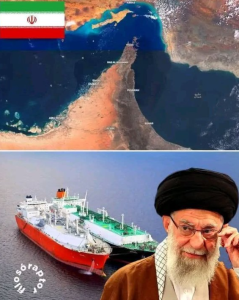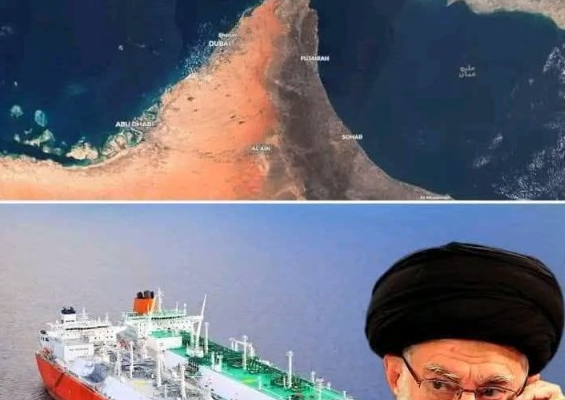
In a development that has generated a storm of reactions worldwide, reports claiming that the Iranian parliament has “approved the closure of the Strait of Hormuz” began circulating rapidly online. The message appeared dramatic, using language that suggested an immediate and decisive move by Iran. Yet when examined carefully, the situation is more complex and less definitive than the viral posts suggest. At the core of this unfolding story is a combination of verified legislative actions in Tehran and exaggerated claims spreading across social media platforms.
The Iranian parliament recently passed a bill to suspend cooperation with international nuclear inspectors. This action came in response to escalating tensions between Iran, the United States, Israel, and several Western nations. Iranian lawmakers accused the international community, particularly the International Atomic Energy Agency (IAEA), of failing to protect Iran’s nuclear facilities after several reported attacks on underground sites. In fiery speeches during the parliamentary session, officials declared that Iran would no longer cooperate under what they viewed as a biased and one-sided arrangement. They emphasized that national security must come before international monitoring.
This bill, however, should not be confused with an actual decision to close the Strait of Hormuz. The Strait of Hormuz is one of the world’s most critical shipping lanes, responsible for transporting a significant portion of the global oil supply. For decades, Iranian leaders have threatened to shut the strait in response to external pressure, particularly sanctions and military threats. But doing so is an enormously serious move, both militarily and economically. It would likely trigger direct confrontation with the United States and its allies, as well as severe economic consequences for global energy markets.
As of now, what parliament has done is approve the suspension of IAEA cooperation. Some members also expressed support for taking a harder stance on foreign shipping and the use of the Strait of Hormuz. But these were statements of political posture, not legally binding decisions to shut the waterway. In Iran’s political system, a decision of that magnitude would not come from parliament alone. It would require the approval of the Supreme National Security Council and ultimately the endorsement of the Supreme Leader. In short, parliament cannot close the Strait of Hormuz by itself.
The confusion stems from how this story spread. Posts on social media platforms took statements made by certain Iranian parliamentarians and presented them as if a formal decision had already been made. This tactic is common in fast-moving geopolitical crises, where partial truths can quickly snowball into major rumors. Within hours of the first posts, many accounts were repeating the claim without evidence or links to official statements. Some even included altered images to make the claim appear more credible. This is a reminder of how easily misinformation can influence public perception during tense international moments.
On the ground, Iran is facing increasing pressure. In recent months, tensions have grown after suspected Israeli strikes on Iranian military and nuclear sites. In response, Tehran has moved to increase its nuclear activities, including uranium enrichment, while reducing transparency with international inspectors. By suspending cooperation with the IAEA, Iran is signaling that it is willing to defy international demands in order to protect what it considers its strategic interests. This is a dangerous game, because it increases the risk of further escalation.
International reactions to Iran’s parliamentary move were swift. The United States condemned the decision, calling it “a dangerous step that undermines global nonproliferation efforts.” The European Union urged Iran to reverse the decision and return to compliance with its nuclear obligations. Israel, which has long viewed Iran’s nuclear ambitions as an existential threat, stated that it would “not tolerate actions that endanger the security of the region.” These reactions underscore the seriousness of Iran’s parliamentary vote, even though it does not yet involve military action or closure of the strait.
Economically, even the suggestion of closing the Strait of Hormuz has global consequences. Energy analysts noted that oil prices spiked briefly after the false reports began circulating. Traders understand that the strait is a critical chokepoint; even temporary disruptions can drive prices up dramatically. Iran is well aware of this leverage. In the past, it has used threats to close the strait as a political tool to pressure Western governments. But actually following through would risk triggering a military confrontation that could isolate Iran even further.
Within Iran, the parliamentary vote also has domestic political implications. Leaders are under pressure to show strength at a time of internal economic hardship. Sanctions have severely strained Iran’s economy, inflation remains high, and public frustration has been mounting. By taking a defiant stance against international oversight, the government seeks to rally nationalist sentiment. This type of political maneuvering is not new. Iranian politicians have often used foreign policy crises to strengthen their position at home. But this does not necessarily mean they are ready to escalate militarily.
Military experts also point out that closing the Strait of Hormuz is not a simple matter. It would require Iran to deploy naval forces, mines, and missile batteries. It would also mean confronting a U.S. naval presence in the Persian Gulf, as well as forces from allied nations. Such an action would almost certainly lead to retaliatory strikes on Iranian military assets and infrastructure. It is therefore unlikely that Iran would make this decision lightly. More often, these threats are part of a strategy of brinkmanship, designed to pressure other countries without triggering a direct war.
For now, the most significant and verifiable development remains the parliamentary approval to suspend cooperation with the IAEA. This step will make it much more difficult for international inspectors to monitor Iran’s nuclear activities. It raises the stakes for diplomatic negotiations and increases fears that Iran may accelerate its nuclear program without external oversight. If diplomacy fails, this could set the stage for new confrontations in the region.
The viral claim about closing the Strait of Hormuz illustrates how misinformation can distort reality during moments of geopolitical tension. A few statements in a parliamentary debate can quickly be spun into a “breaking” headline suggesting imminent conflict. This is why fact-checking and relying on credible news sources is essential. While the situation in Iran is indeed serious, it is different from what the exaggerated posts suggest.
Global powers are now closely watching how Iran’s leadership responds to the parliamentary vote. If the Supreme National Security Council endorses the bill and cooperation with the IAEA formally ends, international pressure will likely intensify. Negotiations may become even more complicated, and sanctions could be tightened further. Meanwhile, any further mention of closing the Strait of Hormuz will continue to have immediate ripple effects on energy markets.
In conclusion, the Iranian parliament has taken a bold and confrontational step by voting to suspend cooperation with international nuclear inspectors. This action reflects both external pressures and internal political calculations. However, it has not passed any binding law to close the Strait of Hormuz, despite what viral posts claim. The real situation is tense but not yet at the level of direct confrontation. The world remains on alert, but facts matter, and distinguishing between verified actions and exaggerated claims is more important than ever.

